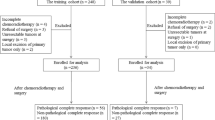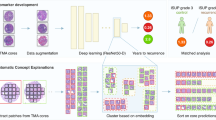Abstract
Prostate cancer is the second most common malignancy in men in the UK. The disease is unpredictable in its behaviour and, at present, no single investigative method allows clinicians to differentiate between tumours that will progress and those that will remain quiescent. There is an increasing need for novel means to predict prognosis and outcome of the disease. The aim of this study was to assess the value of artificial neural networks in predicting outcome in prostate cancer in comparison with statistical methods, using a combination of conventional and experimental biological markers. Forty-one patients with different stages and grades of prostate cancer undergoing a variety of treatments were analysed. Artificial neural networks were used as follows: eight input neurons consisting of six conventional factors (age, stage, bone scan findings, grade, serum PSA, treatment) and two experimental markers (immunostaining for bcl-2 and p53, which are both apoptosis-regulating genes). Twenty-one patients were used for training and 20 for testing. A total of 80% of the patients were correctly classified regarding outcome using the combination of factors. When both bcl-2 and p53 immunoreactivity were excluded from the analysis, correct prediction of the outcome was achieved in only 60% of the patients (P = 0.0032). This study was able to demonstrate the value of artificial neural networks in the analysis of prognostic markers in prostate cancer. In addition, the potential for using this technology to evaluate novel markers is highlighted. Further large-scale analyses are required to incorporate this methodology into routine clinical practice.
This is a preview of subscription content, access via your institution
Access options
Subscribe to this journal
Receive 24 print issues and online access
$259.00 per year
only $10.79 per issue
Buy this article
- Purchase on Springer Link
- Instant access to full article PDF
Prices may be subject to local taxes which are calculated during checkout
Similar content being viewed by others
Author information
Authors and Affiliations
Rights and permissions
About this article
Cite this article
Naguib, R., Robinson, M., Neal, D. et al. Neural network analysis of combined conventional and experimental prognostic markers in prostate cancer: a pilot study. Br J Cancer 78, 246–250 (1998). https://doi.org/10.1038/bjc.1998.472
Issue Date:
DOI: https://doi.org/10.1038/bjc.1998.472
This article is cited by
-
A systematic review of the applications of Expert Systems (ES) and machine learning (ML) in clinical urology
BMC Medical Informatics and Decision Making (2021)
-
Artificial neural networks and prostate cancer—tools for diagnosis and management
Nature Reviews Urology (2013)
-
Artificial neural networks: has the time come for their use in prostate cancer patients?
Nature Clinical Practice Urology (2005)



